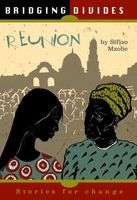Aphiwe doesn’t pester Granny with questions for the remainder of the drive back home. She lets her reminisce about Reggie Perumal in silence. They buy take-away food at the shopping mall in Amanzimtoti, and head home. They eat, and Granny takes her medication. The trip has taken its toll – she needs help getting from the lounge to her bedroom for her afternoon nap.
“What happened to Reggie Perumal, Gran?” says Aphiwe, as she tucks her into bed.
“I honestly do not know, Aphi.”
“How come you never looked for him, Gran?”
“How come he never looked for me?” Granny talks softly, as she does when the pills start to work.
Aphiwe has no answer.
“I looked for him, Aphi,” she says softly. “I looked for him in crowds, in the city. When I walked past a restaurant. Sometimes I’d go and just sit at bus ranks to Indian townships, hoping I’d see him.
“When I did find him, it was only in my dreams. With time I believed he may have relocated to another province, found a good Indian girl and got married. The mixing of races was prohibited and strictly enforced after the Group Areas Act. Even if I’d found him, what would have happened to us?”
“I understand, Gran. I also understand that by telling me, you want me to tell mom.”
“Yes, Aphi. I don’t know how to tell her,” says Granny. “Please tell her for me, my sweet girl.”
When her mother returns from work Aphiwe tells her the story of Granny and Reggie Perumal. Mother and daughter hug as tears fall for the better part of ten minutes.
Her mother heads to Granny’s room. She closes the door behind her. There are no loud voices, just hushed tones as mother and daughter talk for hours.
“What was he like, Ma?” asks Aphiwe’s mom.
“He was a beautiful, sweet man,” says Granny. “You have his eyes. He didn’t know I was pregnant when the forced removals happened. We were just kids and honestly believed that the forced removals wouldn’t happen. Both our fathers fought against them.”
“Did he say where his family would go, if the forced removals happened?”
“It honestly never crossed our minds,” says Granny.
“But you should have told me about him, Ma. I deserved to know.”
“I know … but I had my reasons for keeping this secret,” Granny says, and wipes away her tears. “I didn’t want to let my mind go back to those days … because that whole chapter is the big trauma of my life. I didn’t want to traumatize you as well.”
“But, Ma, we could have gone through it together. You know that it was always just the two of us against the world.”
“I see now that talking about it heals somehow. My heart feels lighter now that I have talked about it. I hope you can forgive me, child.”
Aphiwe’s mom nods while holding her mother’s hand.
“I just couldn’t let you live with the stigma of being mixed race in the township during those volatile times. I know it was your right to know. But what was I to do? There was no manual for how to deal with what happened to us.”
“I understand, Ma.”
“I wanted to raise you to be strong.” Granny holds on tighter to her daughter’s hand. “If I told you while you were young, I didn’t know what it was going to do to you.”
“You stayed strong for me, Ma. I’m thankful for the sacrifices you made for me. But I want to look for him. I have to find him. He is my father.”
“That’s exactly what I feared you’d do if I’d told you when you were younger. That you’d turn your focus away from your studies and look for him.”
“Ma, I just have to find him. Maybe he is still alive.”
“Just leave it alone, child.”
“Today there are easy ways to find people. I have friends who work at Home Affairs and the licensing departments. He must have an ID and a driver’s licence. I’ll try to trace him.”
“He was a good man. He’d be happy to see you. You have my blessing,” says Granny.
Granny falls asleep holding her daughter’s hand.
***
Tell us: Do you find it difficult to believe that apartheid laws back then made it an actual crime for people of different races to have romantic relationships with each other? Is Aphiwe’s mother right to seek her father after all these years?


